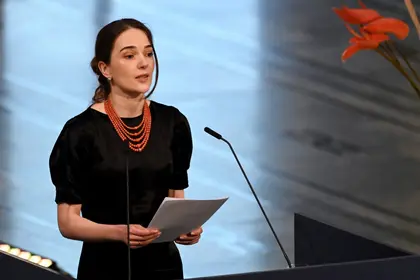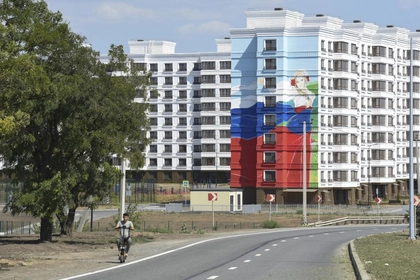On Monday, the National Council of Resistance of Iran (NCRI) held a conference in Paris, attended by international jurists and political figures which included the former president of the International Criminal Court. This marked the 35th anniversary of the massacre of political prisoners by the Iranian regime.
Ukrainian 2022 Nobel Peace Prize winner, Oleksandra Matviichuk, the head of the Center for Civil Liberties of Ukraine, joined the conference via an online link.
“Thirty-five years ago, the Iranian regime executed thousands and thousands of people. The international community is still discussing how many people were killed, but what is obvious is that it is a crime against humanity, which has no statute of limitations,” said Matviichuk in a recorded video, adding that “after 35 years, the relatives of victims are still waiting for justice.”
Monday’s conference was titled, “1988 Massacre, Imperative for Accountability,” and the venue was emblazoned with text that identified that massacre as “ongoing crimes against humanity” and vowed to honor “the sacrifices in pursuit of freedom”.
The event’s keynote speaker, NCRI President Maryam Rajavi, stated that the perpetrators of the massacre had enjoyed four decades of impunity, and called for the investigation and international prosecution of longtime members of the regime’s leadership - including Supreme Leader Ali Khamenei, President Ebrahim Raisi, and Judiciary Chief Gholamhossein Mohseini-Ejei.
“The prosecution of these criminals [would send] a resounding message of justice and accountability to our global society,” Rajavi declared.
Matviichuk echoed this sentiment in her message to the conference, stating that “impunity in the past has clear consequences in the present.” She went on to say that immunity for the Iranian regime in particular has emboldened it to carry on with and expand its malign activities, including its active support for the Russian war on Ukraine.
“I live in Kyiv, and my native city, like thousands of other Ukrainian cities, is constantly being shelled by Iranian drones. What I want to say with this example is that if authoritarian regimes cooperate with each other, we as a people have to support the struggle for justice and for freedom of each other even more. That is why I express my sincere solidarity with the Iranian people and support the idea of the creation of a UN Commission of Inquiry to reveal the truth of what happened in 1988 and to bring the perpetrators to justice,” she said.
The 1988 massacre was prompted by a fatwa instituted by Iran’s, then, Supreme Leader Ruhollah Khomeini, which declared that organized opposition to the theocratic system was proof of “enmity against God,” and thus punishable by death. As a result, “death commissions” were assembled throughout the country to assess the views and affiliations of political prisoners, focusing on supporters of the leading pro-democracy opposition group, the People’s Mojahedin Organization of Iran (Mojahedin-e-Khalq) - MEK.
It is widely recognized that upwards of 30,000 political prisoners were killed in the massacre, of which around 90 percent were members of the MEK. Most victims were buried secretly in mass graves, and although the locations of some of these burial sites have been identified by activist groups over the years, the regime has moved to destroy those sites, thereby adding to the renewed need for an urgent independent investigation into the massacre and its consequences.

Diane Francis Interviews Mikhail Zygar, Yaroslav Trofimov on Prospects of Russia’s War on Ukraine
- See the most contemporary Ukraine news reports for today.
- Look at the latest Ukraine news that was released today.
JOIN US ON TELEGRAM
Follow our coverage of the war on the @Kyivpost_official.
Since the start of the full-scale invasion of Ukraine, Ukrainian and Iranian activists have held a number of events to show solidarity with each other and against the governments of Russia and Iran, which are close partners in suppressing their domestic populations, as well as being complicit in the illegal occupation of Ukraine.
You can also highlight the text and press Ctrl + Enter






